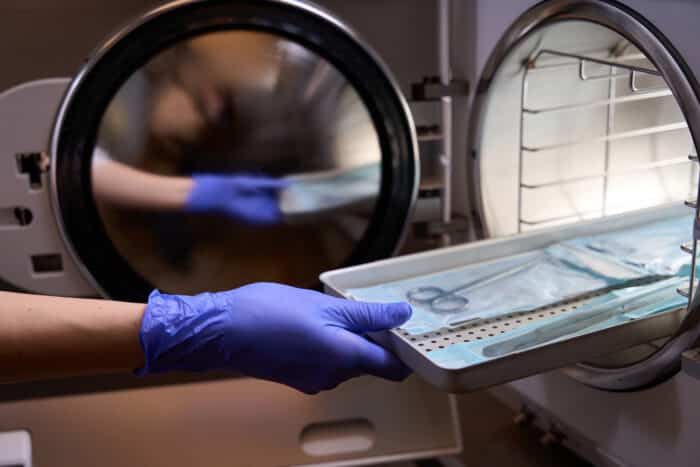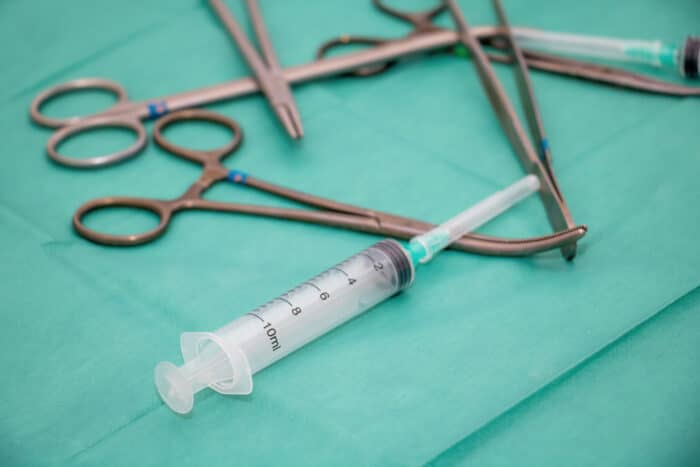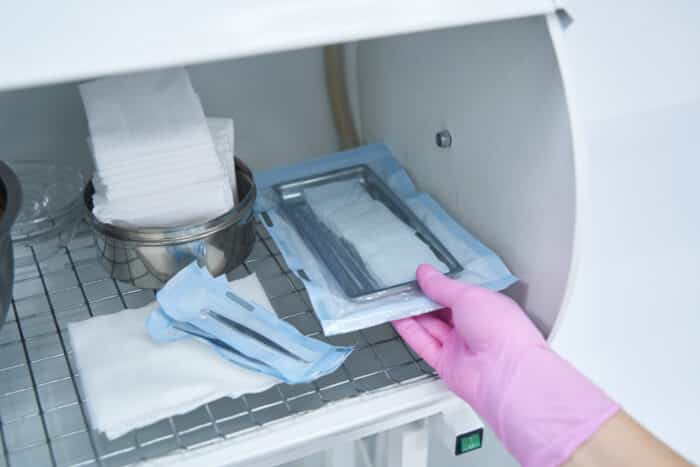Ever thought about diving into the rewarding world of healthcare and being a real-life hero behind the scenes?
Well, if you’ve got a knack for precision and care, becoming a sterile processing technician might just be your calling.
SPTs or sterile processing technicians, are healthcare professionals who work in the background of any healthcare setting, ensuring all the medical instruments are sterile clean, and ready for action, playing an important role in patient safety.
In this article, we’re taking you on a tour through the ins and outs of becoming a sterile processing technician. We’ll discuss the steps, skills, and the time it takes to jump into this rewarding career.
Whether you’re a fresher or someone looking to switch careers, we’ve got your back with everything you need to know.
So, Let’s dive in!
Sterile Processing Technician: An Overview
First, let’s get started with the basics, and answer who exactly are sterile processing technicians, and what they do.
Sterile processing technicians, often known as central sterile processing technicians or sterile processing and distribution technicians, are the backstage heroes of healthcare.
They’re responsible for ensuring that all medical equipment, instruments, and tools used in procedures are thoroughly clean, sterilized, and ready for use.
Their role revolves around:
Cleaning and Sterilizing:
They wash, clean, and make sure all the medical stuff is germ-free and ready for use.
Keeping Inventory:
They manage supplies, order new ones, and keep a record of what’s been cleaned and sterilized.
Testing and Checking:
They make sure all the equipment works perfectly after being cleaned and keep track of everything they do to keep things safe.
Teamwork:
They work closely with doctors, nurses, and others to make sure the right tools are always ready for action.
Also read: What is a Sterile Processing Technician
What Does a Sterile Processing Technician Do?
Choosing the Right Training Program & Why It is Important
The initial and important step to becoming a sterile processing technician is to research and select a training program that suits you best.
Picking the ideal training program is essential for aspiring sterile processing technicians as it lays the groundwork for a successful healthcare career.
An ideal program will offer a thorough and organized curriculum covering all the essential knowledge and practical knowledge you need to become a successful sterile processing technician.
Choosing the right program also involves practical training chances, which is a must for technicians as they regularly handle tasks like sterilizing medical equipment and ensuring it’s ready for use.
What Are the Types of Sterile Processing Technician Training Programs Available?
Understanding the importance of selecting the right training program is key as you enter into the world of sterile processing technicians.
Now, let’s dive into the various training options you can consider:
Associate Degree Programs:
Associate degrees in sterile processing typically last up to 2 years, with costs ranging between $10,000 to $30,000.
This requires a longer commitment compared to certificate or online programs. They generally are offered by community colleges or technical institutes.
These comprehensive programs provide a deeper understanding of sterile processing techniques, healthcare regulations, and advanced skills. They offer a well-rounded education covering not only the practical aspects but also diving deeper into the theoretical knowledge required for the role.
Additionally, an associate degree might open doors to broader career opportunities within the healthcare sector.
However, it’s essential to note the investment of time and money against the potential career advantages when considering an associate degree in sterile processing.
Certificate/Diploma Programs:
These programs typically last up to 12 months or a year, with costs ranging from $1,500 to $5,000.
They’re offered by vocational schools or community colleges and are designed to provide comprehensive training covering both theory and hands-on skills. These hands-on skills are crucial as they involve tasks like sterilizing medical equipment, ensuring you’re well-prepared for the practical aspects of the job.
Online Sterile Processing Programs:
This is the most recommended method of completing your sterile processing technician training program. These online programs vary in duration, spanning from 4 to 6 months, with costs ranging between $1,000 to $2,500.
Online programs offer flexibility in learning schedules, making them a preferred choice for many. Some online courses even allow self-paced learning, granting you the flexibility to study at your own pace, anywhere and anytime.
Financially, they tend to be more affordable and can lead to quicker certification—some programs can get you certified and job-ready in as little as 4 months!
However, an important point to note: Ensure that the online program you choose is accredited and includes practical, hands-on experience.
This hands-on training is vital in reinforcing your theoretical knowledge and preparing you adequately for the real-world tasks you’ll encounter as a sterile processing technician.
Learn More About Preppy’s Online Sterile Processing Technician Training Program here>
See: Sterile Processing Technician Certificate Program Online
How to Become a Sterile Processing Technician
If you’re still with us, and you’ve read through the training program options for sterile processing technicians, you might be eyeing the path to becoming one yourself.
Let’s walk you through the steps:
Step 1: High School Diploma or GED
Having a high school diploma or a GED is like the starting point—it’s the minimum requirement to kickstart your journey.
Step 2: Enroll in a Sterile Processing Training Program
Choosing the right training program is important, as mentioned before. After high school, enroll in a program that offers a comprehensive mix of theory and hands-on training.
Step 3: Gain Practical Experience
Once your training wraps up, aim for practical experience through externships or internships. Some online programs offer these opportunities post-course completion, providing valuable real-world exposure.
Step 4: Certification (Recommended)
While not mandatory everywhere, getting certified is highly recommended. Employers often prefer certified sterile processing technicians over uncertified ones.
Organizations like IAHCSMM or CBSPD offer certification exams, each with its unique structure and duration. Explore and select the one that aligns best with your goals.
See: Sterile Processing Technician Certification
Step 5: Apply for Sterile Processing Jobs
Now that you are ready with certification, start applying for roles in hospitals, clinics, labs, or other healthcare facilities.
Types of Sterile Processing Technician Certifications
When looking for the process of getting certified as a sterile processing technician, you might come across several certifications and that can be confusing.
Let us simplify it for you with a list of the most common and recommended certifications available for aspiring sterile processing technicians:
Certified Registered Central Service Technician (CRCST) by IAHCSMM:
– Cost: The examination fee ranges from $125 to $200, depending on whether you’re an IAHCSMM member or non-member.
– Renewal Fee: The renewal fee is typically around $50 to $75 every three years.
– Requirements: To become certified, candidates must complete an accredited sterile processing program or gain a certain amount of on-the-job training hours. Passing the CRCST exam is mandatory for certification.
Certified Sterile Processing and Distribution Technician (CSPDT) by CBSPD:
– Cost: The exam fee is approximately $125 to $150 for CBSPD members and $175 to $200 for non-members.
– Renewal Fee: The renewal fee is typically around $60 to $75 every five years.
– Requirements: Candidates must complete an accredited sterile processing program or accrue a certain number of hours of hands-on experience. Passing the CSPDT exam is required for certification.
Certified Instrument Specialist (CIS) by IAHCSMM:
– Cost: The examination fee ranges from $125 to $200, based on IAHCSMM membership status.
– Renewal Fee: Renewal typically costs around $50 to $75 every three years.
– Requirements: Candidates must have CRCST certification and work experience before they can qualify for the CIS exam.
Certified Ambulatory Surgery Sterile Processing Technician (CASSPT) by CBSPD:
– Cost: The exam fee is approximately $125 to $150 for CBSPD members and $175 to $200 for non-members.
– Renewal Fee: Renewal typically costs around $60 to $75 every five years.
– Requirements: To qualify, candidates need to have CRCST certification and specific work experience in an ambulatory surgery setting.
These certifications generally require continuing education credits to maintain certification status. The number of credits required varies by certification and can range from 12 to 15 credits every renewal cycle.
Skills Required to Become a Sterile Processing Technician
Now that you know everything about sterile processing as a career, you might be curious about the skills it takes to become a successful one.
Becoming a sterile processing technician requires a blend of technical skills, attention to detail, and a commitment to safety and quality.
Here are some key skills needed:
1. Attention to Detail: You’ll handle a wide range of medical instruments and equipment, so attention to detail is crucial to ensure proper sterilization and assembly.
2. Technical Competence: Understanding various sterilization methods, and equipment, and following strict protocols for cleaning and processing instruments are essential technical skills.
3. Adherence to Protocols and Standards: Strictly following established guidelines and protocols for sterilization, safety, and infection control is fundamental in this role to maintain a sterile environment.
4. Organizational Skills: Managing inventory, keeping records, and tracking sterilization procedures require strong organizational abilities to ensure everything is in order.
5. Communication and Collaboration: Working effectively with healthcare teams, nurses, and surgeons is vital. Clear communication ensures the right instruments are available when needed.
6. Problem-Solving: Being able to troubleshoot equipment issues or adapt to unexpected situations during the sterilization process is valuable.
7. Physical Stamina: The job involves standing for long periods and occasionally lifting heavy instrument trays or equipment.
8. Critical Thinking: Analyzing situations, making decisions, and ensuring the safety of patients and healthcare professionals by maintaining sterile environments require critical thinking skills.
See: Certified Sterile Processing Technician
Conclusion
In the world of becoming a sterile processing technician, time frames might be different according to the program you choose, but the journey is worth it.
From getting the right training to gaining hands-on experience, the path can take a few months to a couple of years.
Related Resources:
- Travel Sterile Processing Technician
- How to Become a Sterile Processing Technician
- Sterile Processing Technician Salary
- Sterile Processing Technician Job Description
- Sterile Processing Technician Requirements
- Sterile Processing Technician Resume
- Sterile Processing Technician vs. Surgical Technologist
- Sterile Processing Technician Training
- Sterile Processing Technician School
- Sterile Processing Technician Certificate Program
- Sterile Processing Technician Course
- Sterile Processing Technician Exam
- CRCST Certification
Related Articles
-
How to Be Successful in College in 2022 – 7 Simple Tips to Succeed
-
How Do Scholarships Work? Read This First…Truth is Shocking
-
7 Best College Majors 2024: What Should I Major In?
-
How to Choose a College – 10 Things You Must Consider in 2024
-
Why Go to College? Top 13 Benefits for Adult Students in 2022
-
Top 5 Best Alternatives to Community College for 2024








